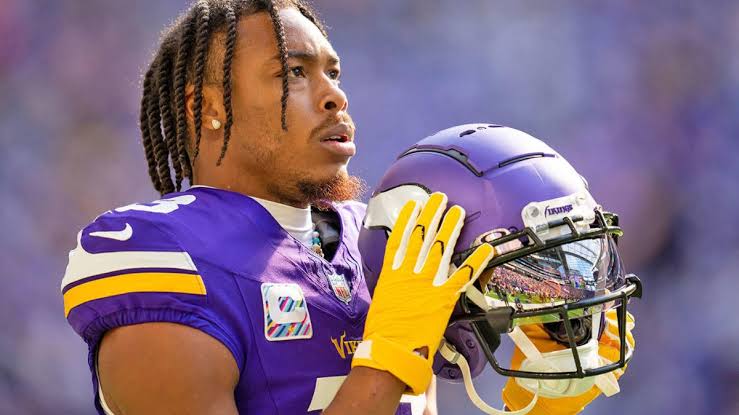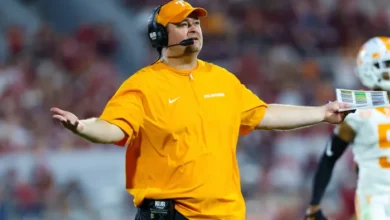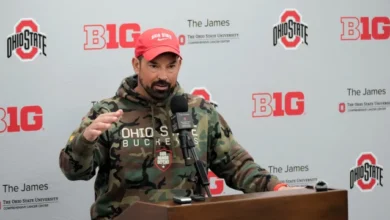
Minnesota Vikings star receiver Justin Jefferson has ignited a firestorm of debate after making a controversial statement regarding his approach to the game. In an interview this week, Jefferson boldly declared, “The plan is to dominate, whether they take me out of the game or not.” The comment, delivered with confidence, has sparked both admiration and backlash from fans, analysts, and players alike.
While Jefferson’s words may be interpreted as a sign of his immense self-belief, his declaration has raised eyebrows for several reasons, most notably the implied arrogance and potential undermining of team dynamics. Here’s a closer look at why this comment has ruffled feathers and what it could mean for his career and the future of the Vikings.
The Confidence Factor: Is It Too Much?
Justin Jefferson is widely regarded as one of the most talented wide receivers in the NFL, and his performance on the field backs up that reputation. After a breakout rookie season, Jefferson has consistently dominated as a top-tier receiver, setting records and becoming a favorite target for Vikings quarterback Kirk Cousins. However, his statement about “dominating” regardless of whether he’s “taken out” has caused some to question whether he’s placing his individual success above the team.
NFL legend Shannon Sharpe was one of the first to call out Jefferson, stating on his show: “This is where you walk a fine line. There’s a difference between confidence and arrogance, and Jefferson is dangerously close to crossing that line. Football is a team sport, and when you start talking like this, you’re suggesting that the game is all about you—not the team’s success.”
Some critics argue that Jefferson’s statement could indicate a growing sense of entitlement and self-centeredness, which could disrupt locker room chemistry. “It’s one thing to have confidence in yourself, but to say that it doesn’t matter if you’re even on the field is a bit much,” said one anonymous NFL insider. “Football is about execution and chemistry. A statement like that could alienate teammates, especially those who rely on the collective effort to win games.”
A Closer Look at the ‘Dominate’ Mentality
For some, Jefferson’s words reflect a mindset that should be applauded. NFL players, especially those in skill positions like wide receiver, often rely on supreme confidence to perform at the highest level. Jefferson, who has been a dominant force in the NFL since his first season, clearly believes that he is the best in the business and expects to assert his will on any given game. In a sport as physically demanding and mentally taxing as football, confidence is crucial to maintain peak performance.
“I love the mindset,” said former NFL wide receiver and current analyst Steve Smith Sr. “You have to have that kind of mentality if you want to be the best. Jefferson isn’t saying he doesn’t care about his team, but he’s telling you he’s not afraid of any challenge. That’s the mentality you need to be a top receiver.”
Furthermore, Jefferson’s statement could be interpreted as a challenge to his coaches and the Vikings organization. He’s essentially saying that whether the coaching staff puts him in the game or not, he will find a way to make an impact, implying that his talent should be utilized to its fullest extent. With teams like the Vikings looking for any edge to secure wins in a highly competitive league, Jefferson’s commitment to “dominate” could serve as a reminder to coaches that star players should never be sidelined for too long.
Disrupting Team Dynamics: Potential Fallout
However, the real controversy arises from the subtle suggestion that Jefferson is above the system. In professional sports, particularly in the NFL, team cohesion and respect for the collective effort are paramount. The idea of any player putting personal dominance over the team’s strategy could create friction, particularly with a veteran roster of players who may have different views on leadership and collaboration.
For instance, veteran Vikings players like quarterback Kirk Cousins and running back Dalvin Cook may view Jefferson’s comments as a disruption to the team’s established hierarchy. If Jefferson’s words are interpreted as disregarding the team’s collective goals in favor of personal glory, it could sow seeds of discontent in the locker room.
“There are guys in that locker room who have been there for years and have seen the ups and downs,” said NFL analyst Mina Kimes. “For Jefferson to say something like this could rub the wrong way, especially with the Vikings not being a Super Bowl contender in recent years. The team can’t afford to have anyone thinking they’re more important than the team’s mission.”
A Broader Reflection of NFL Culture?
Jefferson’s comments also shed light on the growing culture of individualism in the NFL, a league that is increasingly driven by star power and the personal brands of its players. This trend, which has seen players like Tom Brady, Aaron Rodgers, and Patrick Mahomes create larger-than-life personas off the field, has also led to a shift in the way players approach team dynamics.
In this context, Jefferson’s bold declaration may simply be a reflection of a larger shift in how NFL players view themselves. As the league becomes more focused on marketing and personal image, many players—particularly young stars—are growing accustomed to being treated as individual brands rather than just cogs in a team machine. For Jefferson, “domination” could be his way of establishing himself as one of the NFL’s true icons, regardless of the circumstances around him.
The Risk of Backlash: Can He Back It Up?
Of course, with bold claims come the heightened expectations that often lead to scrutiny. The question now is whether Jefferson can back up his words with continued elite play. Historically, players who have made statements like this—whether in football or other sports—are often put under the microscope, and failure to live up to the hype can result in significant backlash.
For Jefferson, the pressure will be on to continue performing at an All-Pro level, as any drop in performance will give critics ample ammunition to argue that his confidence is unwarranted. The Vikings’ offense is largely built around his ability to make explosive plays, and as defenses catch up with his playing style, Jefferson’s ability to remain dominant will be key in determining whether his words come to define his career—or if they become an embarrassing misstep.
Conclusion: Confidence or Hubris?
Justin Jefferson’s statement that “the plan is to dominate, whether they take me out of the game or not” has certainly ruffled feathers. While it’s clear that Jefferson has the skill and confidence to back up his claims, the broader implications of his words could have a lasting impact on both his relationship with teammates and his public image.
In a sport where team unity is paramount and success often hinges on collective effort, Jefferson’s statement may be seen as a necessary challenge to the status quo, or it could be viewed as a self-centered declaration that places individual success over the team’s goals. The coming season will undoubtedly reveal whether Jefferson’s confidence fuels his performance or creates friction in a locker room where collaboration and cohesion are key to reaching the playoffs.
One thing is certain: Justin Jefferson is not one to back down from a challenge. The question is, can he truly dominate, no matter the circumstances? Time will tell.









